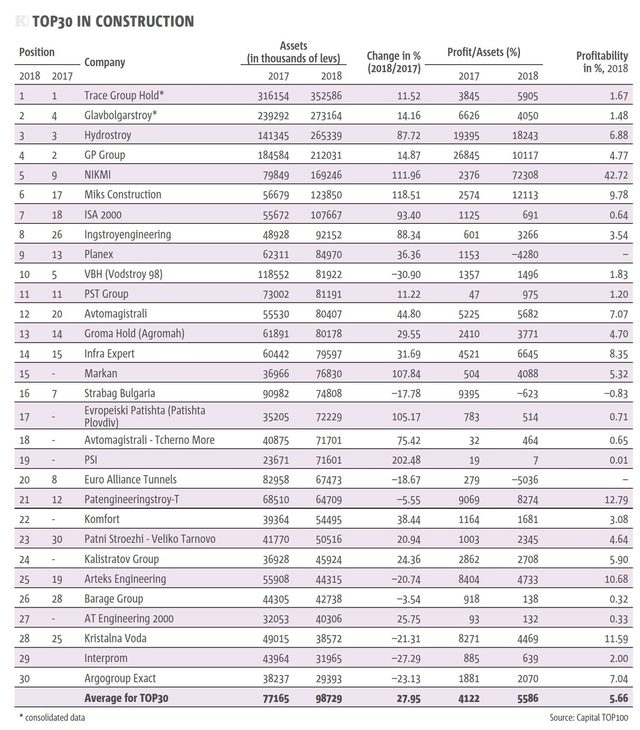- The sector has achieved significant revenue growth mostly as a result of government contracts for infrastructure projects, but also because of a revival in the real estate market
- Four groups of companies traditionally occupy top spots in the ranking: Trace Group Hold, GBS, GPGroup and Hydrostroy
- More office, residential and storage facility builders enter the chart, with some jockeying for lead positions
By the construction sector's own assessment, 2018 was a good year full of optimism and growth. The increase in private investment and the boom in government contracts for infrastructure projects have resulted in soaring revenue. The Top 30 companies reported average growth of nearly 28%. Familiar faces occupy the top positions: Trace Group Hold, GBS, GPGroup and Hydrostroy, albeit in a slightly different order compared to 2017. These four companies have revenue of 1.2 billion levs combined, which is a giant figure by Bulgarian standards.
Some companies that operate outside the highly lucrative sector of government contracts and rely on large privately financed residential or industrial projects have also entered the Top 10. These companies have a harder time achieving growth because in contrast to infrastructure projects, offices, residential buildings and factories get built by dozens of fiercely competing companies. The profit margins, however, are considerably higher. That said, the general picture reveals that construction rarely incurs losses (only two of TOP30 companies reported losses), but the profits are not sizable.
Aside from business being once again handed down mainly by the government, the state-owned highway construction company Avtomagistrali is now a permanent fixture in the ranking. It is likely that in the future the company will nominally head the chart given the government subsidy it was awarded to complete the Hemus highway.
One phase up
Preliminary data from the Bulgarian Construction Chamber for 2018 reveals that the sector earned 14.8 billion levs - a 10% rise over 2017. The organization reports an increase in building and infrastructure construction in the first nine months of 2018. The sector earned 9.77 billion levs in that period, up 10.4% in 2017.
The value of future and currently negotiated contracts announced by the government's two main contracting bodies - the Road Infrastructure Agency and the National Railway Infrastructure Company has increased as well. In addition, there is the bidding for large contracts in the water supply and sewerage sector, where there is a slowdown in the assignation of contracts. The EU-funded program Environment has put 2.4 billion levs aside for projects until 2023.
Data from the National Statistical Institute shows that the total residential floor area under construction in 2018 exceeded the previous year´s figure by 71%.
The usual suspects
Trace Group Hold holds first place based on its consolidated report and replaces GP Group, which headed the ranking in the previous two years. Trace Group Hold suffered reputational damage in 2018 because a road section it had repaired near the town of Svoge became the site of a multiple-casualty bus crash. However, the accident did not affect business.
Trace's revenue grew moderately - by 11.5%, while profitability went up by 50%. According to the company, the main source of revenue projected in Serbia - a 4.75 km lot with six bridges of the highway linking Nis to North Macedonia's Skopje, as well as repairs on the IB 39 state road. The third line of Sofia Metro is another important project for the company. "The construction of the first three metro stations and the rail connecting them started at the beginning of 2016 and will be completed in the fall of 2019. The stations in Ovcha Kupel district will be finished in the first half of 2020," company representatives said. The holding's portfolio contains several smaller projects. In 2018, the company completed the ring road of the coastal town of Aheloy - a project worth 23.2 million levs, as well as several major road and railroad repairs. "We are set to embark on a major skyscraper project," the company stated without elaborating.
Glavbolgarstroy's consolidated report places it second with a revenue of 273 million levs. The 15% growth was offset by a 30% decrease in profitability. The revenue stream had several main sources: the completion of a section of the Struma highway between Kresna and Sandanski for 281 million levs, the expansion of the transit gas pipeline to Turkey, as well as facility repairs along the Hemus highway. The boom in the construction of buildings has also supported revenue growth.
"When it comes to our largest subsidiary Glavbolgarstroy AD, 72% of its projects were funded privately in 2018, including the modest 7% of our own investments. In the past 9 or 10 years, we have not had such a high percentage of private projects and that can only make us happy," Kalin Peshov, a chairperson of the holding company's board, told Capital. The company is also working on pharma company Biovet's factories in Peshtera and Razgrad.
Glavbolgarstroy's ascent in the government contract pecking order intensified this year when the company was hired to build a section of the Sofia ring road for 142 million levs. It also began the 117 million levs construction of the Europе freeway that will connect Sofia to the border with Serbia.
"The development of the construction sector in Bulgaria is palpable," said the managing director of Hydrostroy, Nikolay Pashov. The company achieved remarkable growth compared to 2017, increasing its revenue by 85% to 265 million levs. The 54.9 million levs worth construction of a portion of the Hemus highway between Yablanitsa and Boaza junction is expected to be ready this fall. Mr Pashov added that the company has also completed a project for a water supply network near Skopje in North Macedonia.
It is working on a number of water projects, such as a sewage recycling plant in the coastal resort of Golden Sands and the water and sewage network in the city of Dobrich. Mr Pashov cites examples of completed private projects like the Labyrinth residential complex in Varna and the reconstruction of the Astoria hotel in Golden Sands (both owned by individuals with connections to the company).
Vodstroy, now named VDH, dropped from 5th to 11th place, as its revenue fell by 30%. The company is linked to Hydrostroy through Veliko Zhelev. Even though a simple addition of numbers would rank the combined revenue of VDH and Hydrostroy second, a consolidated approach would place it lower due to deals between the two companies. 23rd place goes to a company in which Mr Zhelev is a minority shareholder, Road Construction-Veliko Tarnovo. The majority holder is another company in the ranking - Patinjeneringstroy -T.
The champion of past years, GP Group, has fallen to the fourth position. The company with controlling shares owned by Georgi Vasilev and Vladimir Zhitenski grew moderately by 15%, while profitability fell significantly from 27 million levs to 10 million levs.
The company is working on the Sofia Metro; it has also completed the construction of the sports hall Arena Shumen and finished the repairs of Graf Ignatiev str. in the capital. Works on the landmark street became emblematic of low-quality execution, triggering an investigation that indicated the company had probably manipulated the public procurement process. Prime Minister Boyko Borissov even stated that GP Group should be banned from all public procurement tenders for a year.
"On the whole, nearly 60% of our revenue came from private projects and the rest from government contracts. The percentage has varied over the years," commented the company's managing director Stefan Totev. He added that GP Group is also building the Garitage Park mixed-use complex in Sofia, as well as the Hyatt hotel in Sofia and the RIU Palace hotel in the coastal resort of Sveti Vlas.
The company will be in charge of a key project - the construction of the Zheleznitsa tunnel on the Struma Highway. Presently it is also the favourite to bag a 200 million levs contract for the completion of a 13 km section of the road between Botevgrad and Mezdra, in northern Bulgaria. The selected contractor will be announced in the coming months.
The private sector can too
Traditionally, the Top 10 group mostly includes companies with government contracts for large infrastructure projects. The current ranking contains no less than three exceptions - NIKMI, Miks Construction and Planex.
Miks Construction, owned by Stefan Ivanov and Plamen Hristov, has achieved the most significant leap. Its revenue soared by 118%, elevating the company from 17th to 7th spot. The increase in profit is impressive as well - it grew nearly fivefold to 12 million levs. The boom is the result of the company's largest project - the construction of the logistics centre of furniture giant JYSK in Bozhurishte near Sofia, a 100-million-euro investment. Miks Construction also operates a reinforced concrete structures production plant in Sofia.
The results are utterly unprecedented. This is especially true of NIKMI's profits. The sale of one of the towers in Sofia owned by the company to UBB Bank for 108 million levs provides a partial explanation. The adjacent residential tower was a likely source of revenue too.
The Varna-based Planex reported a revenue increase of 36%, even though it finished the year at a loss. The company is owned by Planex Holding, operated by Plamen Andreev and Hristo Dimitrov. Their activities are mostly focused on hotels and residential buildings.
The tendency of 2017 that saw the return of private investment has continued. The two-fold increase of Markan's revenue once again earned the company a place in the ranking after it was absent in 2017. Markan concentrates on hotels as well as residential and office buildings.
Another rising star with a mixed profile is Kalistratov Group, which is back in the ranking after it reached the Top 30 in 2017 and reported a revenue increase of 25% for the past year. The company's chief engagement is with supermarket chain Lidl Bulgaria, while it has also won several contracts with the Sofia Municipality. According to the company's financial report, at the end of 2018, it began the construction of residential buildings in the Sofia neighbourhoods of Boyana, Studentski Grad and Vladaya. At the beginning of this year, it earned a contract assigned by Advance Business Center for the construction of an office building and the company has since joined the project.
Moving forward with few people and lots of money
"Experts in the sector expect growth," commented the managing director of GP Group, Stefan Totev. According to him, all divisions - buildings, infrastructure, industrial and logistical facilities - are growing and developing and contracts are increasing accordingly.
The volume in the infrastructure sector increased in 2018 and the same can be expected this year. For instance, the Road Infrastructure Agency announced contracts worth 900 million levs in 2017 and 2.2 billion levs in 2018. The other large government contracting agency - the National Railway Infrastructure Company, announced contracts for 566 million levs. Several of the contracts announced last year will be awarded in 2019, pouring additional revenue into the sector.
"A public contract worth 1.5 billion levs for the railway sector is expected and the plans are to renovate 230 km of railways by 2025," added Totev.
The sector also has its share of challenges. The lack of qualified personnel and workers is the most acute problem for the larger construction companies. "Wages doubled last year," GBS board chairman Kalin Peshov told Capital. Wages have increased, but so has the volume of business handled by companies.
"The sector still faces the challenges of meeting the agreed deadlines and the procurement of resource and personnel for an excellent operating performance, the achievement of our stated aims as well as meeting all expectations," commented Nikolay Pashov, managing director of Hydrostroy.

- The sector has achieved significant revenue growth mostly as a result of government contracts for infrastructure projects, but also because of a revival in the real estate market
- Four groups of companies traditionally occupy top spots in the ranking: Trace Group Hold, GBS, GPGroup and Hydrostroy
- More office, residential and storage facility builders enter the chart, with some jockeying for lead positions
By the construction sector's own assessment, 2018 was a good year full of optimism and growth. The increase in private investment and the boom in government contracts for infrastructure projects have resulted in soaring revenue. The Top 30 companies reported average growth of nearly 28%. Familiar faces occupy the top positions: Trace Group Hold, GBS, GPGroup and Hydrostroy, albeit in a slightly different order compared to 2017. These four companies have revenue of 1.2 billion levs combined, which is a giant figure by Bulgarian standards.












